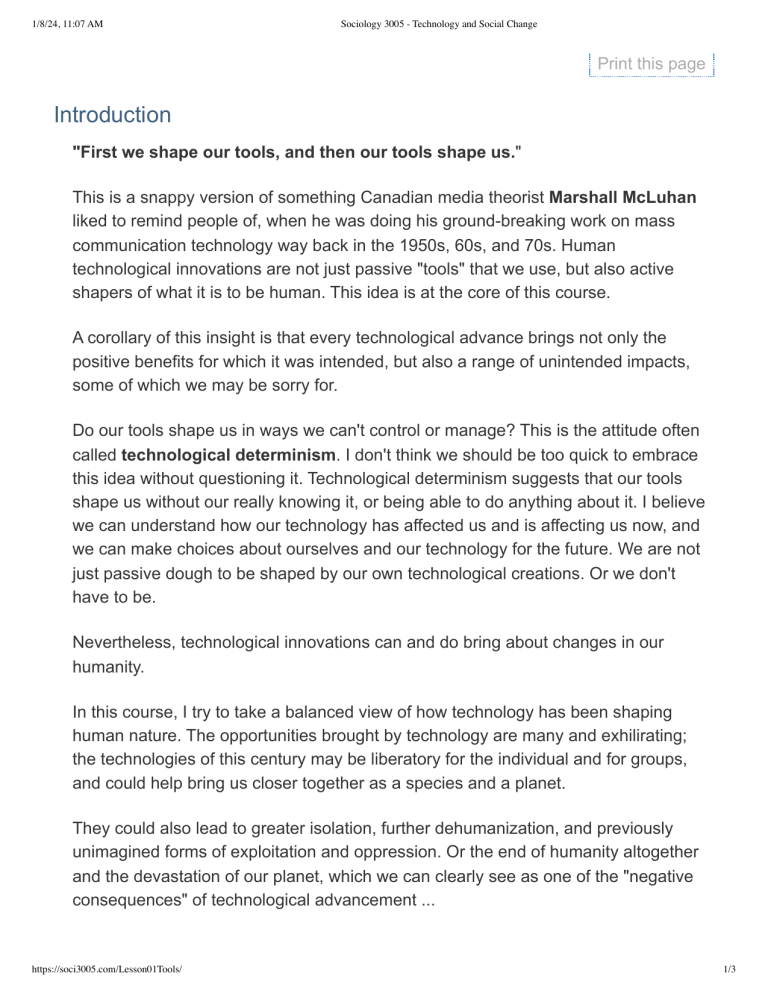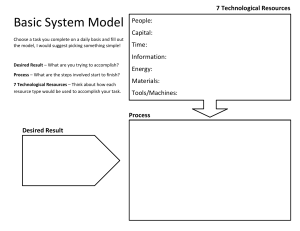
1/8/24, 11:07 AM Sociology 3005 - Technology and Social Change Print this page Introduction "First we shape our tools, and then our tools shape us." This is a snappy version of something Canadian media theorist Marshall McLuhan liked to remind people of, when he was doing his ground-breaking work on mass communication technology way back in the 1950s, 60s, and 70s. Human technological innovations are not just passive "tools" that we use, but also active shapers of what it is to be human. This idea is at the core of this course. A corollary of this insight is that every technological advance brings not only the positive benefits for which it was intended, but also a range of unintended impacts, some of which we may be sorry for. Do our tools shape us in ways we can't control or manage? This is the attitude often called technological determinism. I don't think we should be too quick to embrace this idea without questioning it. Technological determinism suggests that our tools shape us without our really knowing it, or being able to do anything about it. I believe we can understand how our technology has affected us and is affecting us now, and we can make choices about ourselves and our technology for the future. We are not just passive dough to be shaped by our own technological creations. Or we don't have to be. Nevertheless, technological innovations can and do bring about changes in our humanity. In this course, I try to take a balanced view of how technology has been shaping human nature. The opportunities brought by technology are many and exhilirating; the technologies of this century may be liberatory for the individual and for groups, and could help bring us closer together as a species and a planet. They could also lead to greater isolation, further dehumanization, and previously unimagined forms of exploitation and oppression. Or the end of humanity altogether and the devastation of our planet, which we can clearly see as one of the "negative consequences" of technological advancement ... https://soci3005.com/Lesson01Tools/ 1/3 1/8/24, 11:07 AM Sociology 3005 - Technology and Social Change Do our current electronic media technologies serve to connect us or to disconnect us - from each other, from human history, from the realities of nature? I've mentioned Marshall McLuhan, who will make a video appearance in the second lesson, but now I'd ask you to turn your attention to another Marshall: Marshall Soulful Jones That slam is bitter, anguished, and pessimistic. But the ending need not be seen as entirely ironic. Is there some way in which our technology can "make us human again"? That is the question we will be looking at in this humanities course on technology. This class isn't about how to get ahead with more technology; it's about how we can remain human and use technology for purposes that are humane and positive for all. Technology is not new When you think of "technology" your first thoughts are probably of your phone, a computer, the Internet, Artifical Intelligence. We are most familiar with the technology that involves electicity and electronic media and communication. But the word really covers most aspects of human inventiveness, ancient and modern. It could perhaps best be understood as human-designed tools, plus the technical knowledge of how to use them. In this wider anthropological sense, the wheel was an early piece of human technology. Agriculture and selective breeding of animals were forms of technology. Ancient and medieval weapons and machines are part of human technology. I'll be talking about the mechanical clock in a moment - a breakthrough technology. The printing press was a pivotal form of technology in the Western world. https://soci3005.com/Lesson01Tools/ 2/3 1/8/24, 11:07 AM Sociology 3005 - Technology and Social Change The machines of the Industrial Revolution were forms of technology. The machine gun is a piece of technology, as is the jet airplane. In the first half of this class we will take a closer look at the two largest waves of technological change in the modern Western world. These revolutions have had a profound effect on your own existence as a human being in the 21st century, and they continue to shape human culture and existence, for better and for worse. These movements are commonly referred to by historians and sociologists as The Industrial Revolution (1750-1950) and The Information Age (1900- ). These radical technological shifts have given the developed world countless goods: affordable housing, abundant reserves of diverse foodstuffs, indoor plumbing, instantaneous communication across immense distances, and - most recently - near universal access to an impressive and ever-expanding pool of amassed human knowledge (and music!). But with these advantages have come what many people think are significant losses and new evils. The breakdown of the family and a sense of local community, urbanization and a loss of connection to nature, the corporate administration of human slavery in both literal and figurative senses, the meaninglessness of industrial and post-industrial work, the dehumanization, mechanization, and objectification of human beings, weapons of mass destruction, the Greenhouse Effect, and social media tagging of pictures of you drunk and looking like an ass at that party last Saturday. NEXT Print this page https://soci3005.com/Lesson01Tools/ 3/3



